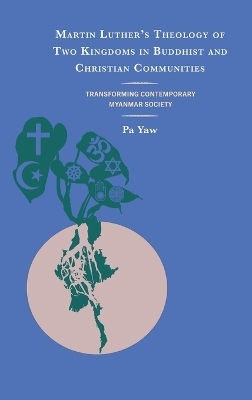
Martin Luther's Theology of Two Kingdoms in Buddhist and Christian Communities
Transforming Contemporary Myanmar Society
Seiten
2024
Lexington Books/Fortress Academic (Verlag)
978-1-9787-1668-1 (ISBN)
Lexington Books/Fortress Academic (Verlag)
978-1-9787-1668-1 (ISBN)
Martin Luther's Theology of Two Kingdoms in Buddhist and Christian Communities examines the principle of separation through Martin Luther’s model of two distinct but interconnected systems between religion and politics in the context of religious communities to give constructive advice and criticism for the health of all human beings.
Religion is a set of beliefs and practices that help form our relationship to God and to our fellow human beings. Religion can inspire commitment to nonviolence and peaceful coexistence in a pluralistic world. However, throughout history, efforts to protect religion, the nation, and the foundations of belief have often made violence a part of religion. As a result, religion becomes a source of both violence and nonviolence. This fact about religion is a great opportunity for nonviolent religious actors to opt for nonviolent movement.
Socially engaged religion teaches that people of faith have a responsibility to address and reduce suffering in all its forms, both physical and spiritual, including suffering resulting from social injustice, exploitation, oppression, false faith, and so forth. True religion engages with society to alleviate suffering and bring transformation. Hence, the ideology of engaged religion supports peace, justice, and freedom, and denounces oppression in every aspect of life. Socially engaged people of faith assume something inherently peaceful and benevolent about religion. Violence in the name of religion is a perversion of true faith. In other words, religious violence is an obscenity, a deviation from the true character of religion.
Martin Luther's Theology of Two Kingdoms in Buddhist and Christian Communities examines the principle of separation between religion and politics in the context of both Buddhist and Christian communities. In predominantly Buddhist context such as Myanmar, where a reciprocal relationship between religion and politics is expected, separation is not effective. Attempts by Christians to separate religion and politics causes the church to run away from tyranny and follow the state with blind obedience. Martin Luther’s model of two distinct but interconnected systems for religion and politics creates space for each institution to give constructive advice and criticism to the other for the health of all human beings.
Religion is a set of beliefs and practices that help form our relationship to God and to our fellow human beings. Religion can inspire commitment to nonviolence and peaceful coexistence in a pluralistic world. However, throughout history, efforts to protect religion, the nation, and the foundations of belief have often made violence a part of religion. As a result, religion becomes a source of both violence and nonviolence. This fact about religion is a great opportunity for nonviolent religious actors to opt for nonviolent movement.
Socially engaged religion teaches that people of faith have a responsibility to address and reduce suffering in all its forms, both physical and spiritual, including suffering resulting from social injustice, exploitation, oppression, false faith, and so forth. True religion engages with society to alleviate suffering and bring transformation. Hence, the ideology of engaged religion supports peace, justice, and freedom, and denounces oppression in every aspect of life. Socially engaged people of faith assume something inherently peaceful and benevolent about religion. Violence in the name of religion is a perversion of true faith. In other words, religious violence is an obscenity, a deviation from the true character of religion.
Martin Luther's Theology of Two Kingdoms in Buddhist and Christian Communities examines the principle of separation between religion and politics in the context of both Buddhist and Christian communities. In predominantly Buddhist context such as Myanmar, where a reciprocal relationship between religion and politics is expected, separation is not effective. Attempts by Christians to separate religion and politics causes the church to run away from tyranny and follow the state with blind obedience. Martin Luther’s model of two distinct but interconnected systems for religion and politics creates space for each institution to give constructive advice and criticism to the other for the health of all human beings.
Pa Yaw is lecturer of church history at Myanmar Institute of Theology, Insein, Yangon, Myanmar (Burma).
Chapter One: Persecution of Ethnic and Religious Minorities in Myanmar
Chapter Two: Martin Luther’s Theology of Two Kingdoms as a Tool for Transformation in Myanmar Society
Chapter Three: Dietrich Bonhoeffer’s Theology of Political Resistance in Light of Luther’s Theology of Two Kingdoms
Chapter Four: Social and Religious Engagement in Myanmar Society
Chapter Five: The Implications of Luther’s Theology of Two Kingdoms in Dialogue with Engaged Religious Communities in Myanmar Today
| Erscheinungsdatum | 15.05.2024 |
|---|---|
| Sprache | englisch |
| Maße | 161 x 239 mm |
| Gewicht | 535 g |
| Themenwelt | Geisteswissenschaften ► Religion / Theologie ► Buddhismus |
| Religion / Theologie ► Christentum ► Kirchengeschichte | |
| Sozialwissenschaften ► Politik / Verwaltung ► Staat / Verwaltung | |
| ISBN-10 | 1-9787-1668-0 / 1978716680 |
| ISBN-13 | 978-1-9787-1668-1 / 9781978716681 |
| Zustand | Neuware |
| Haben Sie eine Frage zum Produkt? |
Mehr entdecken
aus dem Bereich
aus dem Bereich
von Athanasius bis Gregor dem Großen
Buch | Softcover (2024)
C.H.Beck (Verlag)
12,00 €


